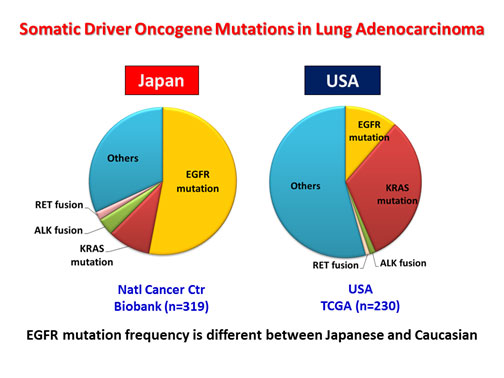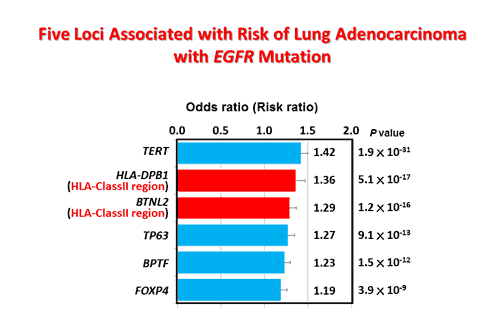Home > Information > press release > HLA-class II and other gene loci associated with susceptibility to EGFR-mutated lung adenocarcinoma
HLA-class II and other gene loci associated with susceptibility to EGFR-mutated lung adenocarcinoma
August 9, 2016
National Cancer Center
RIKEN
Aichi Cancer Center
Akita University
Osaka University
Kyoto University
Gunma University
Shiga University of Medical Science
The University of Tokyo
Kanagawa Cancer Center
Japan Agency for Medical Research and Development
in Japanese
LADC is the most common type of lung cancer worldwide, with incidence and mortality rates increasing in both Asian and Western countries. LADC driven by somatic EGFR (epidermal growth factor receptor) mutations is more prevalent in East Asians (30-50%) than in European/Americans (10-20%). A high proportion of patients with EGFR mutation-positive LADC are never-smokers and females, making the development of a preventive method critical. Therefore, understanding the genetic factors underlying such LADC is required to identify effective methods of prevention and to elucidate disease etiology.
A Nation-wide collaborating group, including National Cancer Center (Drs. Takashi Kohno and Kouya Shiraishi) and other institutions, investigated genetic factors underlying the risk of this disease by conducting a genome-wide association study, followed by two validation studies, in 3,173 Japanese patients with EGFR mutation-positive lung adenocarcinoma and 15,158 controls. Four loci, 5p15.33 (TERT), 6p21.3 (BTNL2, HLA-class II), 3q28 (TP63) and 17q24.2 (BPTF), previously shown to be strongly associated with overall lung adenocarcinoma risk in East Asians, were re-discovered as loci associated with a higher susceptibility to EGFR mutation-positive lung adenocarcinoma. In addition, two additional loci, HLA-class II at 6p21.32 and 6p21.1 (FOXP4) were newly identified as loci associated with EGFR mutation-positive lung adenocarcinoma.
This study indicates that multiple genetic factors, including an immunologic one, underlie the risk of lung adenocarcinomas with EGFR mutations. They will help greatly in clarifying the disease etiology and in identifying high-risk individuals for targeted screening and/or prevention based on a combination of genetic and environmental factors.
EGFR mutation
Recent genome studies have subdivided LADC into several categories, with mutually exclusive activations of responsible oncogenes. One subset of LADC is characterized by mutations in the gene encoding epidermal growth factor receptor (EGFR). Advanced LADCs with EGFR mutations are often inoperable and are treated with tyrosine kinase inhibitors; however, these tumors frequently become drug resistant, leading to disease progress and death. Thus, understanding the genetic factors underlying the development of LADC with EGFR mutation is required to elucidate disease etiology and to identify effective methods of prevention.HLA gene
The human leukocyte antigen (HLA) genes encode the major histocompatibility complex (MHC) proteins in humans. These proteins regulate the immune system in humans. HLA genes are highly polymorphic with many alleles whose distributions are different among populations.Publication
| Journal | Nature Communications, 2016, on line publication. |
|---|---|
| Title |
Association of variations in HLA-class II and other loci with susceptibility to EGFR- mutated lung adenocarcinoma. |
| Authors | Shiraishi K, Okada Y, Takahashi A, Kamatani Y, Momozawa Y, Ashikawa K, Kunitoh H, Matsumoto S, Takano A, Shimizu K, Goto A, Tsuta K, Watanabe S, Ohe Y, Watanabe Y, Goto Y, Nokihara H, Furuta K, Yoshida A, Goto K, Hishida T, Tsuboi M, Tsuchihara K, Miyagi Y, Nakayama H, Yokose T, Tanaka K, Nagashima T, Ohtaki Y, Maeda D, Imai K, Minamiya Y, Sakamoto H, Saito A, ShimadaY, Sunami K, Saito M Inazawa J, Nakamura Y, Yoshida T, Yokota J, Matsuda F, Matsuo K, Daigo Y, Kubo M, Kohno T*. (*corresponding author) |
| DOI | 10.1038 / NCOMMS12451 |
| URL | http://www.nature.com/naturecommunications |
Research Funding
This research was supported by the Practical Research for Innovative Cancer Control from Japan Agency for Medical Research and Development (AMED: 15ck0106096h0002). This work was also conducted as part of the BioBank Japan Project, supported by the Ministry of Education, Culture, Sports, Science, and Technology, Japan (MEXT), and AMED; and was partly supported by a Grant-in-Aid of MEXT for Scientific Research on Innovative Areas- Resource and technical support platforms for promoting research (Platform of Supporting Cohort Study and Biospecimen Analysis).
Press release
HLA-class II and other gene loci associated with susceptibility to EGFR-mutated lung adenocarcinoma (PDF:341KB)For research and development inquiries
National Cancer Center Research Institute
Division of Genome Biology
5-1-1 Tsukiji, Chuo-ku, Tokyo 104-0045, Japan
Tel: +81-3-3547-5272
FAX: +81-3-3542-0807
For media inquiries
National Cancer Center
Office of Public Relations, Strategic Planning Bureau
5-1-1 Tsukiji, Chuo-ku, Tokyo 104-0045, Japan
Tel: +81-3-3542-2511
FAX:+81-3-3542-2545
E-mail: ncc-admin[at]ncc.go.jp (Please replace [at] to @.)


